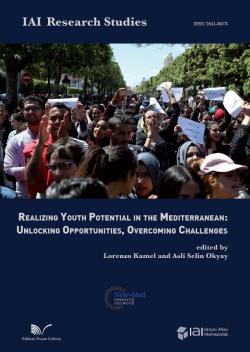Realizing Youth Potential in the Mediterranean: Unlocking Opportunities, Overcoming Challenges
I dibattiti su Medio Oriente e Nord Africa si concentrano prevalentemente sulle questioni securitarie. Si tratta di una messa a fuoco ristretta, oltre alla quale c’è un disperato bisogno del punto di vista di persone della regione sui problemi socio-economici e politici – molti e pressanti – che hanno un forte impatto sociale sui “giovani” (ma non solo). Questo volume mette insieme proprio tali punti di vista: otto giovani studiosi della regione trattano diversi temi – dall’attivismo politico all’emancipazione delle donne, dai problemi ambientali alla disoccupazione – ponendo tutti particolare attenzione alla questione della partecipazione dei giovani. Le loro considerazioni evidenziano la necessità di politiche incentrate sull’individuo e non solo sullo stato, politiche che vadano al di là della mera riproduzione della “solita politica” e rispondano invece ai mutevoli problemi e aspirazioni delle società della regione, sia dei giovani che delle altre fasce di età.
Versione rivista e ampliata dei paper presentati alla conferenza New-Med intitolata “Youth Potential in the Mediterranean. Unlocking Opportunities, Overcoming Challenges”, tenutasi a Roma il 7 maggio 2018 e organizzata dall'Istituto Affari Internazionali (IAI) e dal Segretariato OSCE, in cooperazione con German Marshall Fund of the United States, Programma International Affairs della Compagnia di San Paolo e Ministero degli Affari esteri e della Cooperazione internazionale.
-
Dati bibliografici
Roma, Nuova Cultura, ottobre 2018, 112 p. -
Numero
2 -
ISBN/ISSN/DOI:
978-88-3365-112-5
List of Contributors, p. 7-8
List of Abbreviations, p. 9-10
Foreword, by Nicolò Russo Perez, p. 11-13
Introduction, by Lorenzo Kamel and Asli Selin Okyay, p. 15-19
1. “Youth” of Syria: An Antithesis to an Authoritarian System of Power, by Bilal Sukkar, p. 21-33
1.1 Deconstructing the concept of “youth”
1.2 Marginalization of a “youth”-driven political alternative
1.3 Civil society: Thriving in the absence of regime hegemony
Conclusion
Policy recommendations
2. The PA’s Security Role and Youth Political Representation as Pathways for a Workable Palestinian National Reconciliation Deal, by Ahmed G.S. Sukker, p. 35-46
2.1 The Palestinian national reconciliation
2.2 Dispute over the PA’s security role
2.3 Grounds for modification of the PA’s security role and professionalization of security forces
2.4 Changing preferences of the youth
2.5 The way forward
3. Contesting Top-down Led Women’s Empowerment: The Case of Saudi Arabia, by Huda Alsahi, p. 47-56
3.1 Assessing recent women’s empowerment reforms
3.2 Contesting women’s empowerment
3.3 Viewing the recent empowerment reforms as enabling factors
4. Democracy in the Making: Youth and Local Governance in Tunisia, by Tasnim Abderrahim, p. 57-69
4.1 Why promote youth participation in local governance?
4.2 Challenges to an active youth engagement in local governance
4.3 Dismantling barriers to youth participation
Conclusions and way forward
5. Escaping Water Stress in the MENA Region, by Abed Al Kareem Yehya, p. 71-86
5.1 Background
5.2 The water-energy-food nexus
5.3 Water issues in Lebanon: Irrigated agriculture and water stress
5.4 Is agriculture the right path for the Bek’aa?
5.5 Can solar energy farming be a feasible substitute to irrigated agriculture?
5.6 What about food security?
5.7 Bottlenecks: Political stability and governance
Conclusions and policy recommendations
6. A Second Resource Curse: Articulating the Consequences of the Looming Resource Crisis in the Middle East and Plotting a Path for Sustainable Development, by Manar Sarie and Ahmad Abdulla, p. 87-99
6.1 Our approach
6.2 The future of MENA
6.3 Potential technological interventions
Conclusions
7. Socially Inclusive Fourth Industrial Revolution: Fostering Youth Employment in the Middle East and North Africa, by Semuhi Sinanoğlu, p. 101-112
7.1 Context
7.2 Policy challenges
7.3 Programme interventions
7.4 Policy/programme recommendations
Policy recommendations




